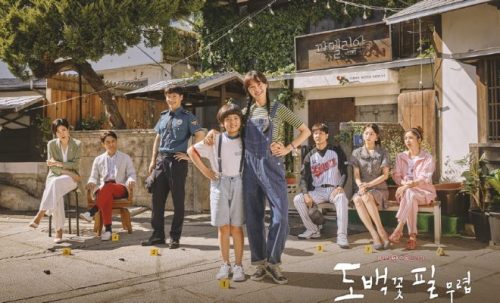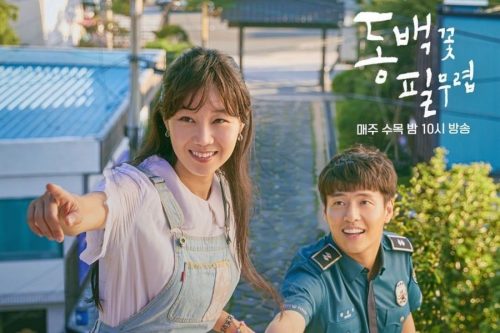K-drama review: When the Camellia Blooms

I really enjoyed this recent release, which came out in September – November 2019 (KBS/Netflix) and is already award winning. When the Camellia Blooms effectively combines a really sweet romance with a modern twist and a suspenseful crime drama.
(I say “modern twist” because it’s about an unmarried mother finding romance, which wouldn’t be particularly novel in a European or American drama, but in Korean TV these things just don’t get depicted.)
Oh Dongbaek (Gong Hyo-jin, who I know from the excellent Don’t Dare to Dream and the mediocre Pasta) moves to the small (fictional) town of Ongsan as an unmarried single mother of a toddler. She opens a bar and surprises everyone by braving the locals’ cool reception and malicious gossip to make a modest success of her life. Six years later, romance comes knocking but at the same time, Kang Jong-ryul (Kim Ji-seok), the father of her son Pil-gu, finally tracks her down. He’s been busy playing pro baseball and making a reality show about his perfect-on-the-surface marriage to model Jessica, so he has money but not a lot else going for him.
Hwang Yong-sik (Kang Ha-neul, who has the most adorable goofy smile) is a police officer who was raised in Ongsan but has been away for years. Now he’s back, causing problems for his mother, his police superiors and for local criminals. He’s passionate and tends to throw himself full-throttle into situations. He falls hard for Dongbaek when he sees her stand up for herself to a rude customer and begins to woo her. And when he realises that an old serial murderer he’s been looking into may have reason to target Dongbaek, he makes solving the case his priority (despite being a junior officer whose responsibilities lie more in the realm of petty theft and neighbour disputes).
Despite him wanting to keep Dongbaek safe (from drunk customers, rude neighbours, potential murderers), Yong-sik very rarely rushes in to save her. He usually stands back and lets her sort her own shit out. He tries to befriend Pil-gu without being too weird or presumptuous about it. He is a little naive and innocent, but he’s always cards-on-the-table honest and he never for a minute looks down on or pities Dongbaek. I think…I think he might be a feminist? In a K-drama?
Kang – like my favourite Korean actor Jo Jong-suk (who co-starred in Don’t Dare to Dream with Gong Hyo-jin) – started his career in musical theatre and continues to intersperse stage roles with film and TV. I think this shows in a certain playfulness to their acting style, as well as great comic timing and presence.
Dongbaek, which means “camellia” in Korean, is warm-hearted and generous, but not a pushover. She runs a successful business (though she is working long hard hours at it, she’s hardly raking it in) and she turns the other cheek to gossip. Over time she has made some friends locally, including Hyang-mi, a woman who works for her. Hyang-mi turned up penniless and homeless, which Dongbaek could relate to, having been raised in an orphanage herself.

The small-town setting is perfect for this kind of drama. Everyone knows everyone else, which creates a sense of cosiness or claustrophobia depending on the circumstances. It also invites comedy characters and moments, particularly around the women who work in “crab alley”, a street apparently renowned throughout Korea for its crab restaurants. These small businesses are all run by women and their husbands are rarely seen or mentioned. This makes Dongbaek both one of them and an outsider, as the only one whose business is a bar.
I get the impression there is still significant stigma around single parenthood in Korea. One of the reasons given for Yong-sik not caring that Dongbaek is a single mother, is that he too was raised by a single mother. In his case, his father died in an accident while his mother was pregnant with him, but in flashbacks we see that she too was judged for choosing to cope on her own. One thing I liked is that this drama teaches that some of that stigma is just for show. If you cut yourself off from others they will find something to judge you for. If you make yourself part of the community, they will accept you no matter what.
Kim Kang-hoon, who plays Pil-gu, does good kid acting. He’s annoying and/or gets the wrong end of the stick sometimes but he’s also cute and does a good job of some very emotional scenes. However, some of the adult actors are less good. There is definitely some overacting – mostly from Jong-ryul and Jessica, but also Mr No the landlord and the ladies of crab alley. Thankfully the leads are good enough actors that all the big emotional moments work.
The show has some other faults. The timeline is sometimes confusing as it jumps around a lot (unlike most K-dramas, the majority of this show’s many flashbacks are not repeats of scenes from previous episodes but actual pre-2019 storyline). There are many many red herrings and other forms of misdirection used to mostly positive but occasionally frustrating effect. And in the latter half of the series, the show seriously overeggs the motherhood theme, with some very cheesy slogans flashed up on the screen.
There are some more adult storylines that are implied rather than said outright. Which is occasionally frustrating when what appears to be an important piece of information isn’t really explained. But it also allows for more misdirection, and allows the show to be modern and not, you know, prudish.
It’s sad that even in a show released in the last few months, the concept of single motherhood is portrayed as shocking, but maybe this drama’s portrayal of Dongbaek as a hero, a devoted mother and a successful businesswoman will help fight negative stereotypes.